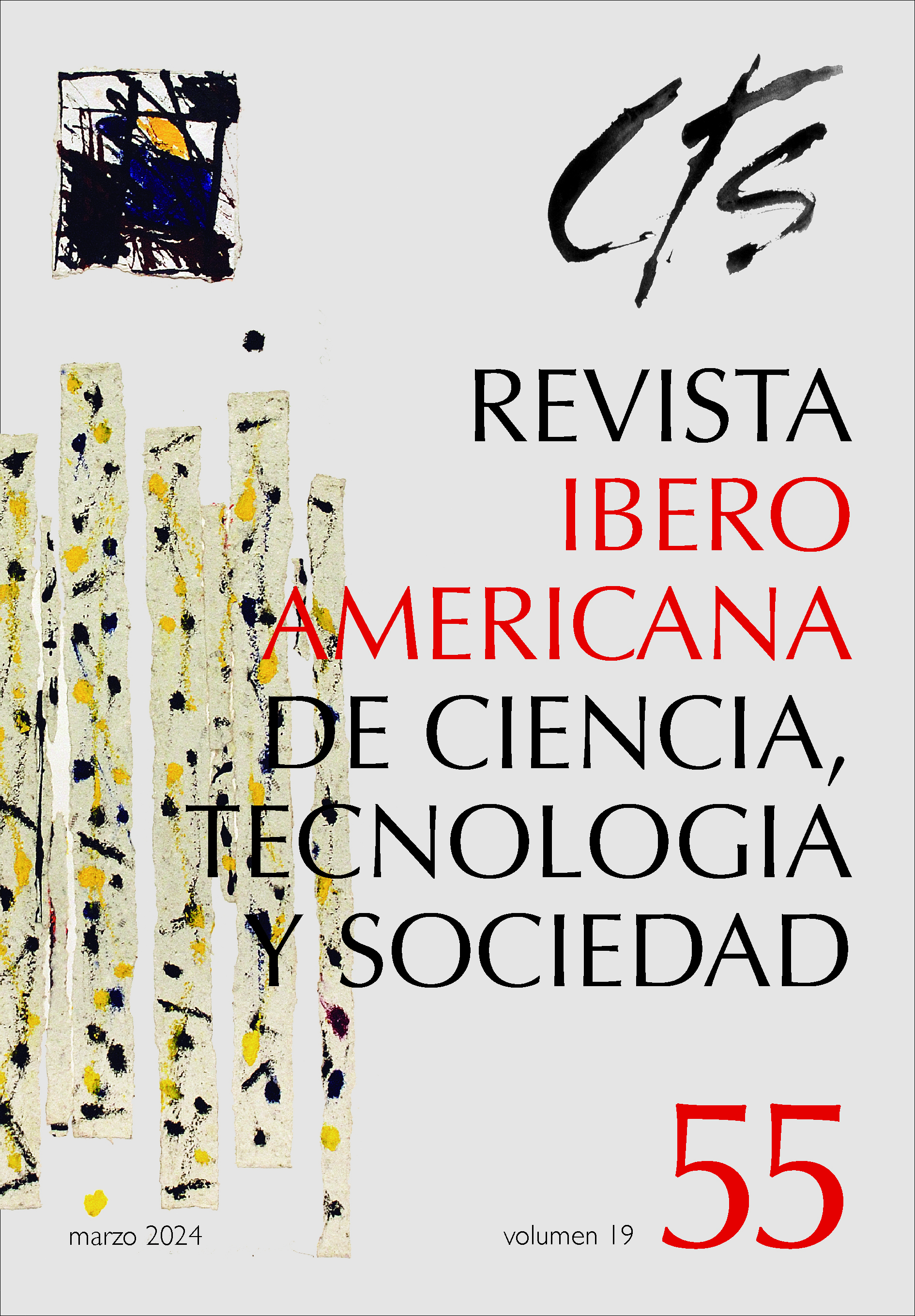Tecnociencia feminista
Una propuesta de demarcación
DOI:
https://doi.org/10.52712/issn.1850-0013-424Palabras clave:
feminismo, demarcación, valores, pragmatismo, tecnocienciaResumen
El reciente debate sobre la viabilidad de diseñar un nuevo criterio de demarcación para limitar el papel de los valores no deseados en la práctica tecnocientífica aborda diferentes estrategias. Se presenta como punto de partida que este problema no puede ser delimitado con criterios de demarcación fijos, ya que el rol de los valores es una cuestión abierta, contextual y sujeta a la evaluación crítica y situada. En este artículo se propone recuperar algunos de los resultados de la filosofía feminista de la ciencia para avanzar en un marco general de propuestas y estrategias que, de forma combinada y desde una perspectiva filosófica pragmatista, puedan incrementar el rigor, integridad y confiabilidad de la práctica tecnocientífica, y dirigirla hacia metas ética y democráticamente defendibles.
Descargas
Citas
Alcoff, L. & Potter, E. (1993). Feminist Epistemologies. Nueva York: Routledge
Bleier, R. (1991). Feminist Approaches to Science. Nueva York: Teachers College Press.
Callon, M. (1999). Actor-network theory-The Market Test. En J. Law & J. Hassard (Eds.), Actor network theory and after. Oxford & Malden: Blackwell.
Carter, S. M., et al. (2020). The ethical, legal, and social implications of using artificial intelligence systems in breast cancer care. The Breast, 49, 25-32. DOI: https://doi.org/10.1016/j.breast.2019.10.001.
Coeckelbergh, M. (2021 [2020]). Ética de la Inteligencia Artificial. Madrid: Ediciones Cátedra.
Douglas, H. (2009). Science, policy, and the value-free ideal. Pittsburg: University of Pittsburg Press.
Echeverría, J. (2003). La revolución tecnocientífica. Madrid: Fondo de Cultura Económica.
Eubanks, V. (2021 [2018]). La automatización de la desigualdad. Madrid: Capitán Swing S.L.
Fricker, M. (2017 [2007]). Injusticia epistémica. Barcelona: Herder Editorial.
Franssen, M. & Kroes, P. (2009). Sociotechnical Systems. En J. Olsen, S. Pedersen & V. Hendricks (Eds.), A Companion to the Philosophy of Technology. Chichester: Blackwell Publishing Ltd.
Goisauf, M. & Cano Abadía, M. (2022). Ethics of AI in Radiology: A Review of Ethical and Societal Implications. Frontiers in Big Data, 5, 850-383. DOI: https://doi.org/10.3389/fdata.2022.850383.
Haraway, D. (1991). Simians, Cyborgs and Women. The Reinvention of Nature. Londres: Free Association Books.
Haraway, D. (1997). Modest_Witness@Second_Millenium. FemaleMan©_Meets OncoMouse™. Feminism and Technoscience. Nueva York: Routledge.
Haraway, D. (2019 [2016]). Seguir con el problema. Bilbao: Consonni.
Harding, S. (1986). The Science Question in Feminism. Nueva York: Cornell University Press.
Harding, S. (1991). Whose Science? Whose Knowledge? Nueva York: Cornell University Press
Harding, S. (2015). Objectivity and Diversity: Another Logic of Scientific Research. Chicago: University of Chicago Press.
Holman, B. & Wilholt, T. (2022). The new demarcation problem. Studies in History and Philosophy of Science, 91, 211-220.
Intemann, K. (2010). 25 Years of feminist Empiricism and Standpoint Theory: Where Are We Now? Hypatia, 25, 778-796.
Jasanoff, S. (2004). States of Knowledge. The Co-production of Science and Social Order. Londres: Routledge.
Jasanoff, S. (2016). The Ethic of Invention. Technology and The Human Future. Nueva York: W.W. Norton & Company Ltd.
Keller, E. F. (1985). Reflections on Gender and Science. New Haven: Yale University Press.
Kitcher, P. (2001). Science, Truth, and Democracy. Nueva York: Oxford University Press.
Kitcher, P. (2011). Science in a Democratic Society. Nueva York: Prometheus Books.
Kitcher, P. (2021). Moral Progress. Nueva York: Oxford University Press.
Koskinen, I. & Rolin, K. (2022). Distinguishing between legitimate and illegitimate roles for values in transdisciplinary research. Studies in History and Philosophy of Science, 91, 191-198.
Latour, B. (1992 [1983]). Ciencia en acción. Barcelona: Labor.
Longino, H. (1990). Science as Social Knowledge. Values and Objectivity in Scientific Inquiry. Princeton: Princeton University Press.
Longino, H. (2002). The Fate of Knowledge. Princeton: Princeton University Press.
Perdomo, I. (2016). Género y tecnologías. Ciberfeminismos y construcción de la tecnocultura actual. Revista Iberoamericana de Ciencia, Tecnología y Sociedad -CTS, 11(31), 171-193. Recuperado de: https://www.revistacts.net/contenido/numero-31/genero-y-tecnologias-ciberfeminismos-y-construccion-de-la-tecnocultura-actual/.
Pérez Sedeño, E. (2019). Feminist epistemologies and objectivity: moving towards a feminist science. En E. Pérez Sedeño et. al. (Eds.), Knowledges, Practices and Activism from Feminist Epistemologies. Wilmington: Vernon Press.
Pinch, T. & Bijker, W. (2012). The Social Construction of Facts and Artifacts: Or How the Sociology of Science and the Sociology of Technology Might Benefit Each Other. En W. E. Bijker, T. P. Hughes & T. Pinch (Eds.), The Social Construction of Technological Systems. New Directions in the Sociology and History of Technology. Cambridge: The MIT Press.
Resnik, D. B. (2009). Playing Politics with Science. Nueva York: Oxford University Press.
Resnik, D. B. & Elliot, K.C. (2023). Science, Values, and the New Demarcation Problem. Journal for General Philosophy of Science, 54, 259-286. DOI: https://doi.org/10.1007/s10838-022-09633-2.
Richardson, S. (2010). Feminist Philosophy of Science: History, Contributions, and Challenges. Synthese, 177, 337-362.
Rolin, K. (2021). Objectivity, Trust, and Social Responsibility. Synthese, 199(1-2), 513-533. DOI: https://doi.org/10.1007/s11229-020-02669-1.
Schiebinger, L. (1999). Has Feminism Changed Science? Cambridge: Harvard University Press.
Schiebinger, L. (2008). Gendered Innovations in Science and Engineering. Standford: Standford University Press.
Schiebinger, L. (2020). Gendered Innovation 2: How inclusive analysis contribute to research and innovation. Publicaciones de la Comisión Europea.
Wacjman, J. (2006 [2004]). El Tecnofeminismo. Madrid: Cátedra.
Wylie, A. et al. (1990) Philosophical Feminism. A Bibliographic Guide to Critiques of Science. Resources for Feminist Research, 19, 2-36.
Descargas
Publicado
Cómo citar
Número
Sección
Licencia
Derechos de autor 2024 CC Attribution 4.0

Esta obra está bajo una licencia internacional Creative Commons Atribución 4.0.
Todos los números de CTS y sus artículos individuales están bajo una licencia CC-BY.
Desde 2007, CTS proporciona un acceso libre, abierto y gratuito a todos sus contenidos, incluidos el archivo completo de su edición cuatrimestral y los diferentes productos presentados en su plataforma electrónica. Esta decisión se sustenta en la creencia de que ofrecer un acceso libre a los materiales publicados ayuda a un mayor y mejor intercambio del conocimiento.
A su vez, para el caso de su edición cuatrimestral, la revista permite a los repositorios institucionales y temáticos, así como también a las web personales, el auto-archivo de los artículos en su versión post-print o versión editorial, inmediatamente después de la publicación de la versión definitiva de cada número y bajo la condición de que se incorpore al auto-archivo un enlace a la fuente original.











